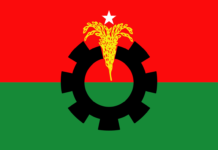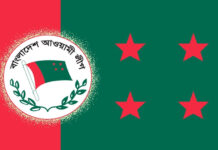
The scenes were starkly opposite in the camps of the two rival parties.
Fanfare and exuberance were clearly visible at the Awami League office in the capital, as the ruling party started selling nomination papers for the next general elections yesterday.
On the other hand, fear and tension ran high at the BNP office, as the party leaders were worried about possible arrests and carrying forward the ongoing movement.
The pictures more or less define the current political situation that has already heated up over the next general election.
By opening the sale of nomination forms, the AL has given the opposition a clear signal that it cares less about the BNP’s joining the elections under the AL formula of an all-party government.
This also makes it clear that Prime Minister Sheikh Hasina and many leaders of her party are confident about holding the election in early January without any major resistance from the opposition.
The BNP-led alliance has already declared that it will boycott and resist the polls if held under the Hasina-led government.
The AL believes that the BNP, mainly for its organisational weakness, will not be able to build any strong resistance like that the AL did in the run-up to the farcical polls of February 15 in 1996, said AL insiders.
The BNP’s failure to perk up street agitation during this government’s tenure has made the AL leaders so confident, they said.
In reality, the ruling party’s assessment is largely true.
Organisational weakness, intra-party conflict and the government’s tough stance on the opposition have made the BNP high command doubtful about the success of the ongoing agitation, said BNP insiders.
They fear the BNP-led alliance may not succeed in waging a street agitation strong enough to either force the government to install a non-party interim administration or call off the polls.
In order to resist the 1996 election, the AL and other parties enforced tougher agitation programmes like blockade and hartal. In the face of violent street protests, the then BNP government imposed “mass curfew” and held the polls.
With the opposition parties boycotting the election, it failed to gain credibility for very low turnout — only 20.97 percent.
This time, the AL policymakers are making efforts to ensure a turnout of more than 50 percent in the next election even if the BNP-led alliance finally boycotts the polls, said AL insiders.
“The upcoming election would be held amid festivity. We hope that all voters would exercise their franchise,” said AL General Secretary Syed Ashraful Islam while opening the sale of his party’s nomination forms at the AL central office at Bangabandhu Avenue.
“The country will have a new government by mid-January next year,” he said.
The AL’s current strategy has already worried the main opposition party. With the recent change in the Representation of the People Order, a candidate is no longer required to be affiliated with a party for three years to contest the polls on its ticket. This allows a party member to join any other party to contest the election.
 In stark contrast, police stand guard in front of the BNP office in Nayapaltan, barring leaders’ and activists’ access to the office. There are only two people in the office, an office assistant and BNP Joint Secretary General Rizvi Ahmed, who has practically been living there for at least two weeks.Photo: Palash Khan
In stark contrast, police stand guard in front of the BNP office in Nayapaltan, barring leaders’ and activists’ access to the office. There are only two people in the office, an office assistant and BNP Joint Secretary General Rizvi Ahmed, who has practically been living there for at least two weeks.Photo: Palash Khan
BNP high-ups fear many of the party’s mid-level leaders may leave the BNP and join other political parties to contest the next polls on the ruling party’s assurance of having them elected as lawmakers.
It will be a big challenge for the party to prevent its leaders from joining the election, alongside waging a strong street agitation, according to BNP insiders.
Khaleda Zia was initially unwilling to contest the 2008 polls under the then military-backed caretaker government, said a BNP standing committee member, preferring anonymity.
But the BNP chief finally changed her mind, fearing that her party might get split if it boycotted the election, said the BNP leader.
“But this time, the situation is different. It will be difficult for the party to change its decision and take part in the election under the current government,” said the party leader.
Some BNP policymakers said the issue was discussed briefly at Thursday’s meeting of the party’s standing committee at the BNP chairperson’s Gulshan office.
In its efforts to smother disagreement within the party, the BNP has taken a strategy to keep its leaders and activists busy by holding tougher programmes like hartal, said a senior BNP leader.
Source: The Daily Star









